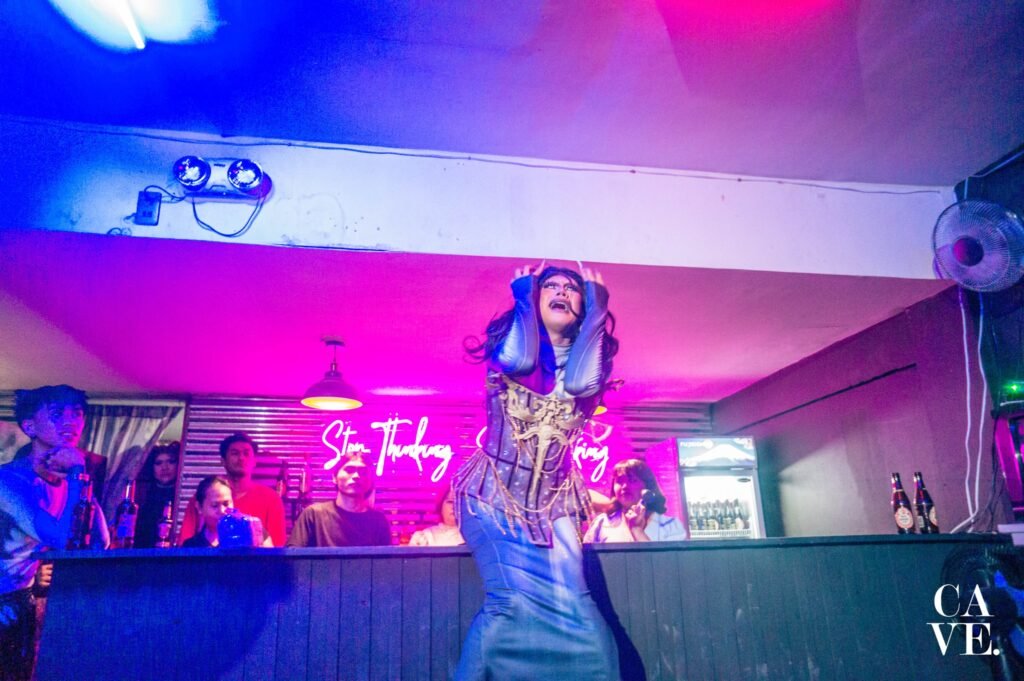Welcome to the Philippines, where being queer often comes with a condition.
“Certain venues… didn’t want to be branded as queer or lesbian, but was willing to work with us otherwise—just don’t be ‘too’ queer.” That’s what The Sunny Club organizers discovered when finding venue partners for women loving women (WLW) events in Metro Manila.
A new survey found that 74% of 5,000+ queer Filipino youth were discriminated against due to their sexual orientation or gender identity, with some experiencing physical threats and abuse. About half also described their communities as “tolerant” or outright unaccepting, contradicting the Philippines’ reputation as an LGBT-friendly country.
Organizers for the LGBTQ+ community emerge in defiance. From Manila’s queer parties to Cebu’s drag shows, people are creating the safe spaces they wish they had growing up. Not because it’s easy, but because it’s necessary.
Tibok Book Store
Tibok Book Store specializes in Filipino LGBTQ+ literature, operating as an independent online bookstore while organizing pop-ups and workshops. “We read, review, and promote creative work to shift pinoy reading culture towards these [queer] communities,” said the founder, Alysha Magtuto.
What started as a catalog of four books from a single publisher has grown to over 30 titles from traditional and independent publishers. Tibok also accepts consignments and offers wholesale arrangements for queer writers, poets, and visual creatives, becoming a platform for emerging LGBTQ+ voices to reach readers.
Beyond sales, Tibok organizes writing workshops with queer authors and maintains a strict anti-discrimination policy: “We do not entertain homophobia and transphobia, and we work with partners that share the same views.”
Cave
The Cave started as a “man cave”—a regular bar with arcade games and drinks. It became one of the first drag bars in Cebu when Pride Month came around last year and the owner, Ed Christian Escarda, realized there were virtually no places to watch drag performances in Cebu.
“I tapped some drag performers because I wanted to have regular drag shows,” Ed shared. “It was initially just for Pride. A one-time show.”
With overwhelmingly positive reception from the community, the team started organizing shows once a month until it eventually ramped up to three times a week from Fridays through Sundays.
Cave organized over 90 drag shows and listening parties with drag queen and creative director, Maria Lava. They also found and encouraged new queens to perform, which gave performers a stable space to call home after struggling to find venues for the art form.
But sustaining a queer business comes with challenges.
“The biggest struggle is really making the business work for the community,” Ed admitted. “There are some niches or groups within the community who aren’t really accepting of drag… who aren’t really exposed to drag, which intimidates them.”
To address this, Cave partnered with other groups and initially offered free shows before charging a 100-peso door fee—itself considered relatively low compared to drag bars in Manila.
For reasons undisclosed, Cave closes its doors on the last day of Pride Month with a star-studded show and the community it’s cultivated.
“I think that’s one of the biggest impacts we have made – to actually create a genuine and authentic community that understands each other, a community that loves each other,” Ed shared.
LoveYourself White House
LoveYourself White House provides free HIV testing, treatment, and trans and mental health services throughout Metro Cebu. It also distributes free condoms and lubricants, and offers pre-exposure prophylaxis (PrEP) and post-exposure prophylaxis (PEP).
Spaces like LoveYourself White House fill crucial gaps in healthcare access for LGBTQ+ Filipinos, creating spaces where people can receive affirming care without judgment.
In 2024, LoveYourself White House received three Department of Health awards for highest anti-retroviral treatment enrollment, highest HIV testing rates, and highest PrEP enrollment in Central Visayas.
The Sunny Club
Sunny started as a group of queer teenagers wondering, “Wouldn’t it be fun to have a day or night to be with people who are like us?” It has now become one of Metro Manila’s most beloved sapphic communities.
The Sunny Club organizes everything from parties to cafe hangs to art markets, creating multiple entry points for queer women to find their people.
Their loud and proud approach has come with unexpected challenges. “It was hard to deal with accounts of homophobic harassment, or difficulties with organizing just because it was lesbian or queer,” the team shared.
The Sunny Club also started with no event planning experience. Instead of having DJs lined up, attendees queued gay anthems up on Spotify during one of their very first sapphic events. At one point, they even got stuck playing Jojo Siwa’s Karma on repeat due to signal connections, but the community took it in stride.
Despite starting from scratch, the collective has created something larger than parties. “People make their own communities and connections, and we’re more of the portal or the connector for them,” they explained. “We know people who have gotten married or have stayed best friends because of an event.”
Queer spaces and events take time to build, but organizers trudge on, conscious that these spaces are essential infrastructure for survival and flourishing.
“As long as you have the heart for it, and the determination to make it happen, that community and that space can and will happen,” said The Sunny Club’s team. “We always, always need more queer projects and initiatives in the Philippines.”

